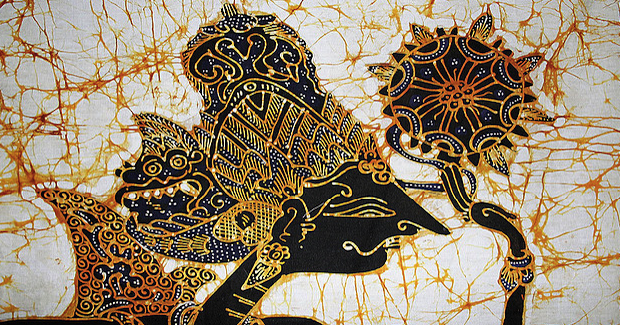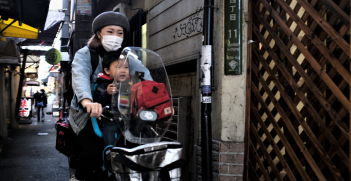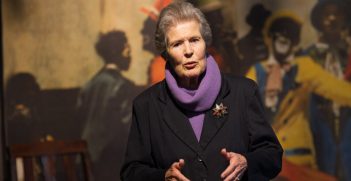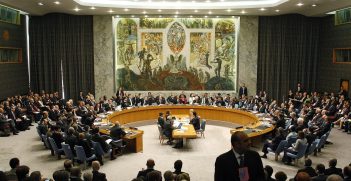Indonesia in 2016: Protests and Progress

In Indonesia this week, all eyes have been on the trial of Jakarta governor Basuki Tjahaja Purnama, known as Ahok. It is the culmination of one of Indonesia’s most significant events of 2016—a year of progress and protests for Australia’s northern neighbour.
Progress
Economically, Indonesia’s GDP grew at 5 per cent in 2016, 2 per cent less than hoped for because of the global slowdown, and especially that in China. The result is that in nominal GDP terms, Indonesia is two ranks below Australia but in PPP (purchasing power parity) it is 2.5 times larger—and with 10 times more people. The debt service ratio remains at a healthy 30 per cent of GDP and an Indonesian e-commerce entrepreneur was named “Asian of The Year” by the Straits Times.
Environmentally, forest fires and the clearing of native vegetation continued almost unchecked in an effort to meet the insatiable global demand for timber, pulp and paper, and palm oil. Massive despoliation of river systems and coastal zones also continues despite efforts to reclaim public land, deal with pollution and rehabilitate some areas.
The Ring of Fire continued to produce virtually daily reports of seismic activity with three big eruptions across the archipelago in 2016. These forced the evacuation of about 13,000 people in North Sumatra, the disruption of tourist flights into Bali, and the disruption of domestic flights in the Moluccas.
In sport, Indonesia won a gold medal in its primary Olympic sport, badminton; as well as two other silver medals. The country is also preparing to host the Asian Games in 2018. The national sport of soccer has been bedevilled by a split in the national league as well as the poor leadership and administration that saw it suspended by FIFA in May 2015. However, with an army officer at the helm, it was readmitted earlier this year after some reforms were undertaken.
The Indonesian police continue to contain the level of terrorism with only minor incidents throughout the year. Deradicalisation still needs much work but amendments to the laws on terrorism are inching towards parliamentary endorsement. A major operation around Poso, Central Sulawesi, involving over 3000 police and troops succeeded in killing Islamic militant Santoso in July. Santoso’s group was trying to secure a remote base area, and operations are still trying to track down the remaining 10 diehards.
President Jokowi broadened his parliamentary base in January when Golkar joined his coalition. A cabinet reshuffle in July allowed him to replace underperformers, bring in ministers from other coalition parties—some good some not—return Sri Mulyani Indrawati to the finance ministry, and sideline retired general Luhut Binsar Panjaitan, who was overshadowing him in the media. The broadening of political support allowed Jokowi to break the grip of his party leader, Megawati, but he mollified her by appointing her favourite, Budi Gunawan, deputy chief of police, to the National Intelligence Agency.
Perhaps his most welcomed appointment was that of the relatively junior Tito Karnavian to chief of police. He is a strong supporter of police reform and has seven years before he is due for retirement. However, the limits of what is possible in this area became evident later in the year.
The issuing of the Award by the Arbitral Tribunal on the Philippines case against China in the South China Sea on 12 July passed with Indonesia making a bland statement of support for the UN Convention on the Law of the Sea rather than commenting on the specifics of the case. In trying to uphold its non-party status in the dispute, Indonesia surrendered any pretense to regional leadership on the issue. However, it did respond more vigorously to continued intrusions by Chinese Coast Guard-escorted fishing forays into Indonesia’s Exclusive Economic Zone north of Natuna Island.
Protests
The major event at the end of the year has been the beginning of the campaigns for 100 mayoralities and governorships across Indonesia with elections due in mid-February. The three-month campaigns are testing everyone’s endurance—nowhere more so than in Jakarta where Basuki Tjahaja Purnama, known as Ahok, is running for re-election as governor.
Ahok, an ethic Chinese Christian, became governor when Jokowi stepped down on being elected president in 2014. He was an abrasive but popular can-do governor with many enemies in the Jakarta legislature and bureaucracy who opposed his reforms. Nevertheless, he had strong support among the youth and more progressive elements in Jakarta as well as in the financial community, and was eventually nominated by Megawati’s party along with the support of others. All was going well until Ahok contested interpretations of the Koran supposedly forbidding Muslims from voting for non-Muslims.
The hardliners, who had already been disrupting his campaign, lodged a complaint of blasphemy with the police and organised a mass demonstration for 4 November to demand his arrest. The demonstration was peaceful until nightfall when most of the demonstrators had dispersed. The police and military quickly contained several incidents thereafter but it was enough to cause the president to cancel his visit to Australia at the last minute.
Religion has always been a powerful mobilising tool for conservative Islamists and unscrupulous politicians wanting to use the threat or actuality of mob violence for political gain. This potential for primordial mob violence has haunted Indonesian elites since 1945 and continues to do so.
Demands for Ahok’s arrest mounted and further demonstrations were scheduled. However, Jokowi on the advice of his security team quickly undertook a series of visits to opposition party leaders, the parliament, military and police units, and the major Islamic organisations to consolidate support.
However, the hardliners had to be mollified too and this is where the intersection of law, conflict resolution, and political opportunism become enmeshed. Any rational legal assessment of the complaint against Ahok would dismiss the allegations as frivolous. However, the hardliners had mobilised so much support that it took a political decision to proceed with formal charges to lower the political temperature. Now the question is whether the panel of judges in Ahok’s expedited trial will have the courage to find him not guilty.
While Ahok’s other two electoral opponents have declared that they will not play on his minority status, the job is being done for them daily by the hardliners, the justice system and growing anti-Chinese sentiment. This stems from discontent with the rising levels of investment from China and their labour practices, as well as various elements of the media. This ferment has particularly favoured the previous president’s son, Agus Harimurti Yudhoyono, who is the Democratic Party candidate.
Despite another huge demonstration by 500,000 people on 2 December passing without further mayhem, Jokowi has incurred political and, no doubt, financial debts, to the opposition parties and various Muslim organisations. By bringing them back into the limelight, he simultaneously isolated and mollified the hardliners with Ahok’s head courtesy of the legal system.
Nevertheless, Jokowi has continued to promote his economic reform agenda and driving home the message that Indonesia has three big problems: pervasive corruption, an inefficient bureaucracy, and outdated and inadequate infrastructure. The irony is that Ahok was Jokowi’s best hope for addressing them in Jakarta but now the chance of his being allowed to do so seem slim.
Whether the influence of the hardliners will wane after the elections in mid-February is unclear but firm action by the government and more support from the political and religious elites is needed if the inclusive and tolerant tenets of the Pancasila are to have real substance. The success of their efforts will have repercussions for Jokowi’s quest for more foreign investment and his prospects for a second term.
Bob Lowry is a student of Indonesian politics and the military. He is president of the AIIA’s ACT Branch.
This article is published under a Creative Commons Licence and may be republished with attribution.





